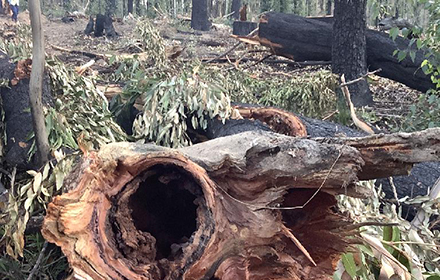The NSW Environment Protection Authority has issued Forestry Corporation of NSW with a Stop Work Order to cease tree harvesting in part of South Brooman State Forest near Bateman’s Bay. Source: Timberbiz
It is the second time in less than a week that a Stop Work Order has been issued to Forestry Corporation.
Earlier this week the EPA issued Forestry Corp with a Stop Work Order to cease tree harvesting at Wild Cattle Creek State Forest inland from Coffs Harbour. That order referred to the illegal felling of two protected trees with a stump diameter over 140cm.
EPA Executive Director Regulatory Operations Carmen Dwyer said EPA investigations into operations in Compartment 58a of the South Brooman State Forest had revealed serious alleged breaches of the rules that govern native forestry operations, in relation to the protection of trees that must be permanently retained.
“Officers allegedly found 26 hollow bearing trees that were either felled or damaged, with many of these trees also not identified and mapped in the planning phase.
“This area is known to be home to several threatened species that use hollow bearing trees. The Yellow-bellied Glider, the Glossy-Black Cockatoo and the Powerful, Masked and Sooty Owls are all listed as vulnerable species and may use hollow bearing trees for habitat,” Ms Dwyer said.
“The importance of identifying, mapping and protecting these vital trees is a key requirement and there should be proper processes in place to ensure compliance.”
After the recent Black Summer bushfires, the EPA imposed additional site-specific conditions on the existing strict environmental controls, called the Coastal Integrated Forestry Operations Approval (IFOA), to mitigate the specific environmental risks caused by the bushfires at each site, including impacts on plants, animals and their habitats, soils and waterways.
The site-specific conditions include the requirement to identify, map and permanently retain all trees with hollows, whether alive or dead.
As a result of the seriousness of the alleged breaches, the EPA has issued a Stop Work Order under the Biodiversity Conservation Act to stop Forestry Corporation logging in the relevant compartment. The order ensures that no further tree harvesting takes place in the area where the trees were felled for 40 days, or until the EPA is confident that Forestry Corporation can meet its obligations to comply with the IFOA including the site-specific conditions.
“This is the first Stop Work Order the EPA has issued for breaches of the site-specific conditions put in place for burnt forests and is necessary because failure to properly map and retain hollow bearing trees could result in irreparable environmental harm,” Ms Dwyer said.
The investigation into the matter is ongoing and non-compliance with the Coastal IFOA can attract a maximum penalty as high as $5 million.
Stop Work Orders and penalty notices are examples of a number of tools the EPA can use to achieve environmental compliance including formal warnings, official cautions, licence conditions, notices and directions and prosecutions. A recipient can appeal and elect to have the matter determined by a court.






